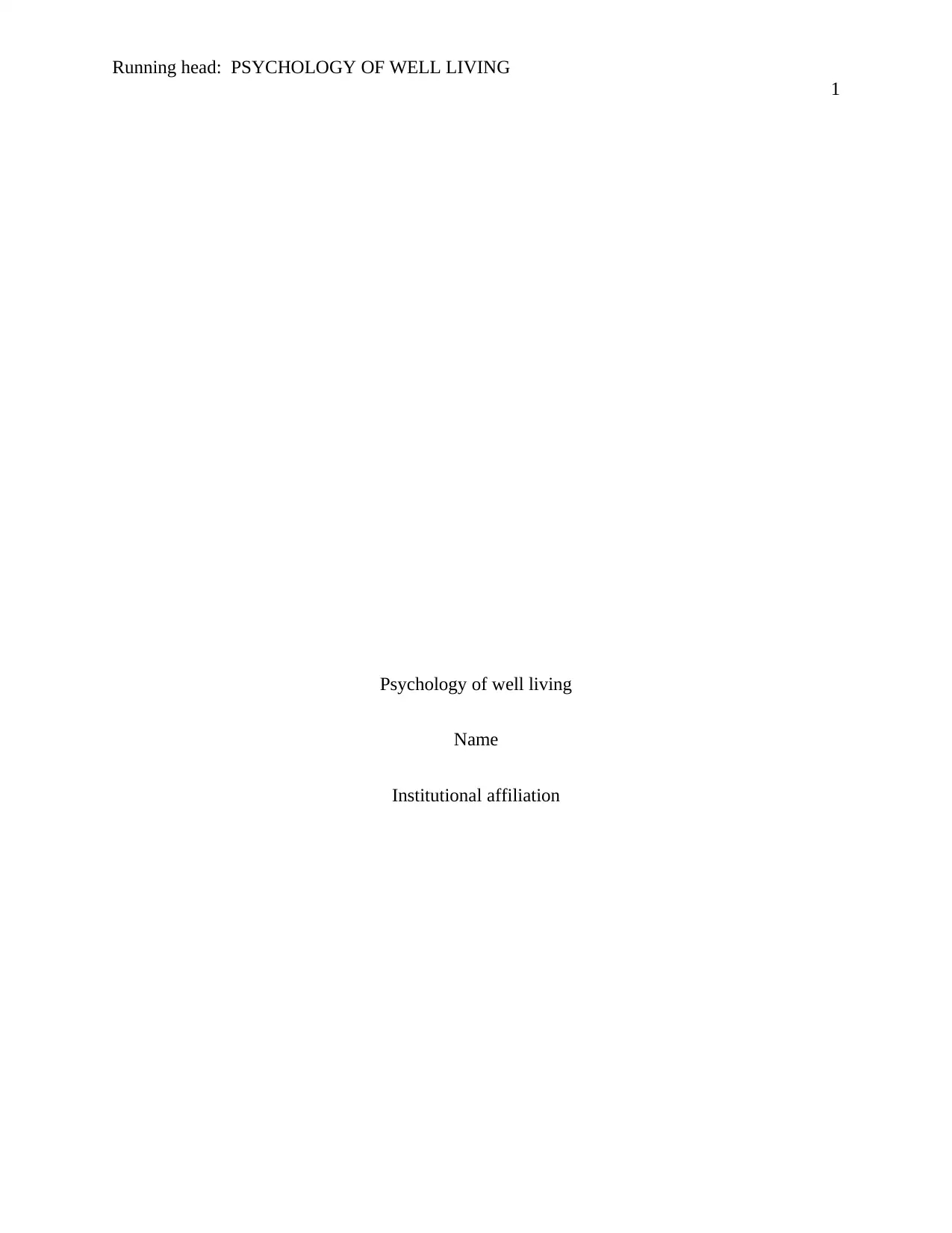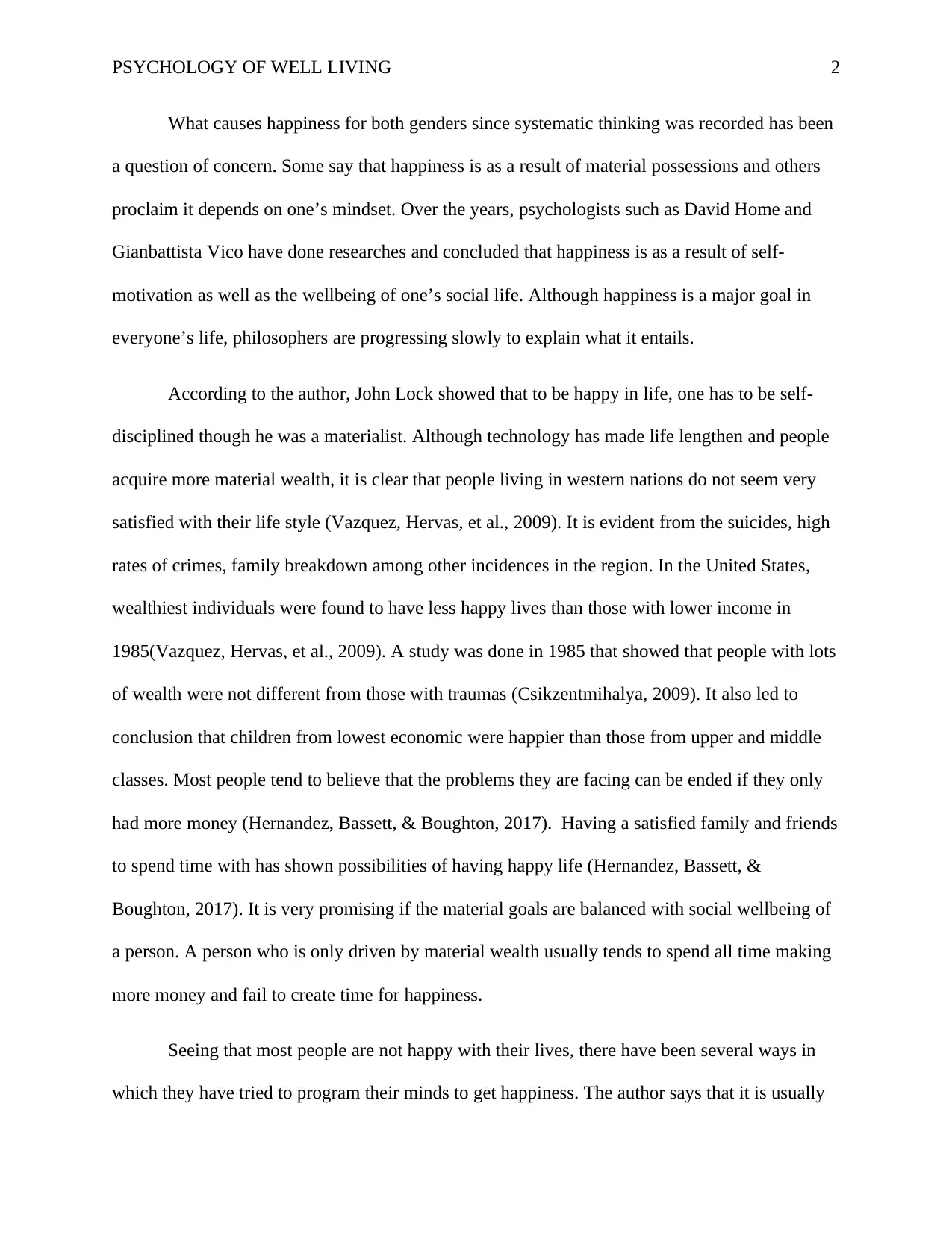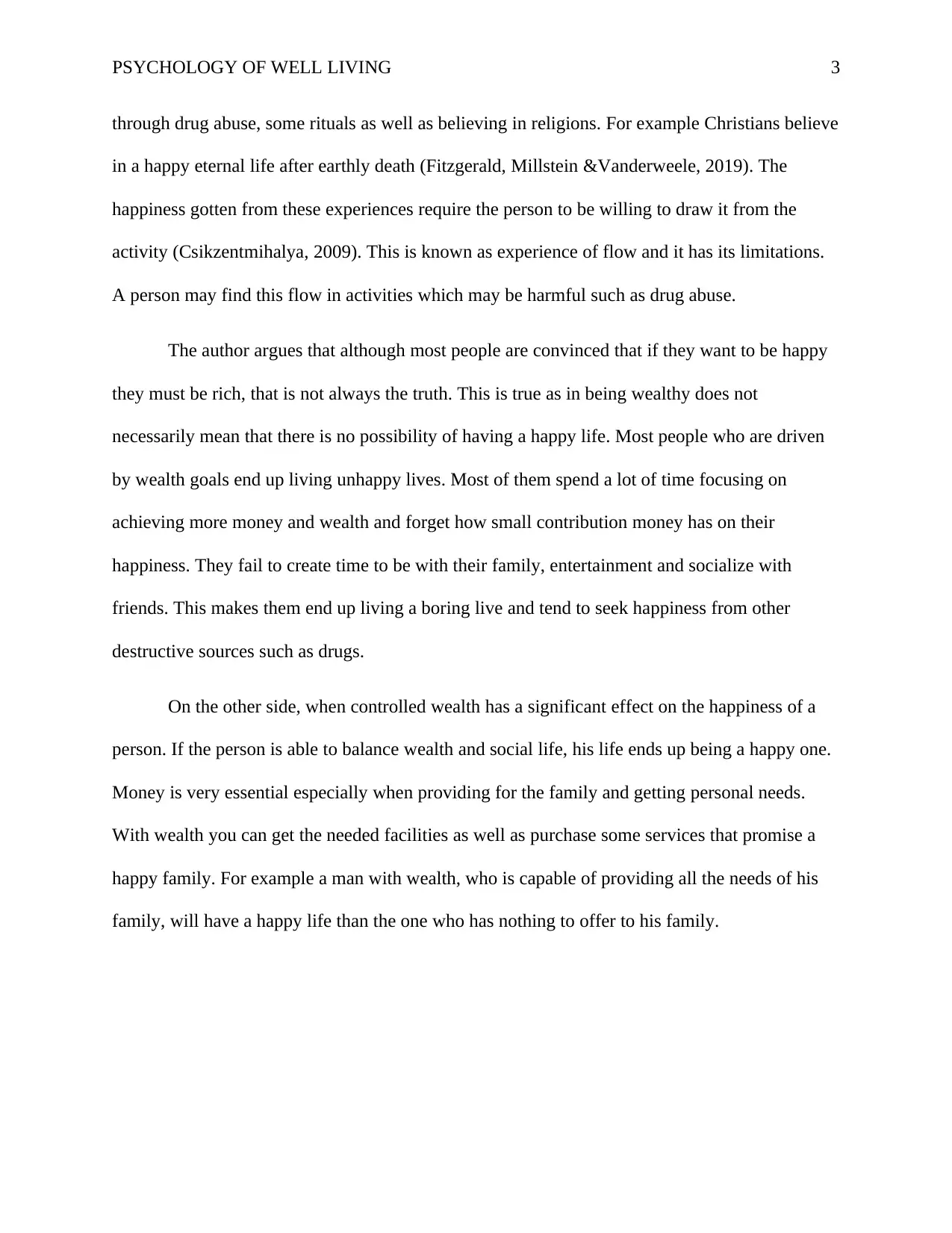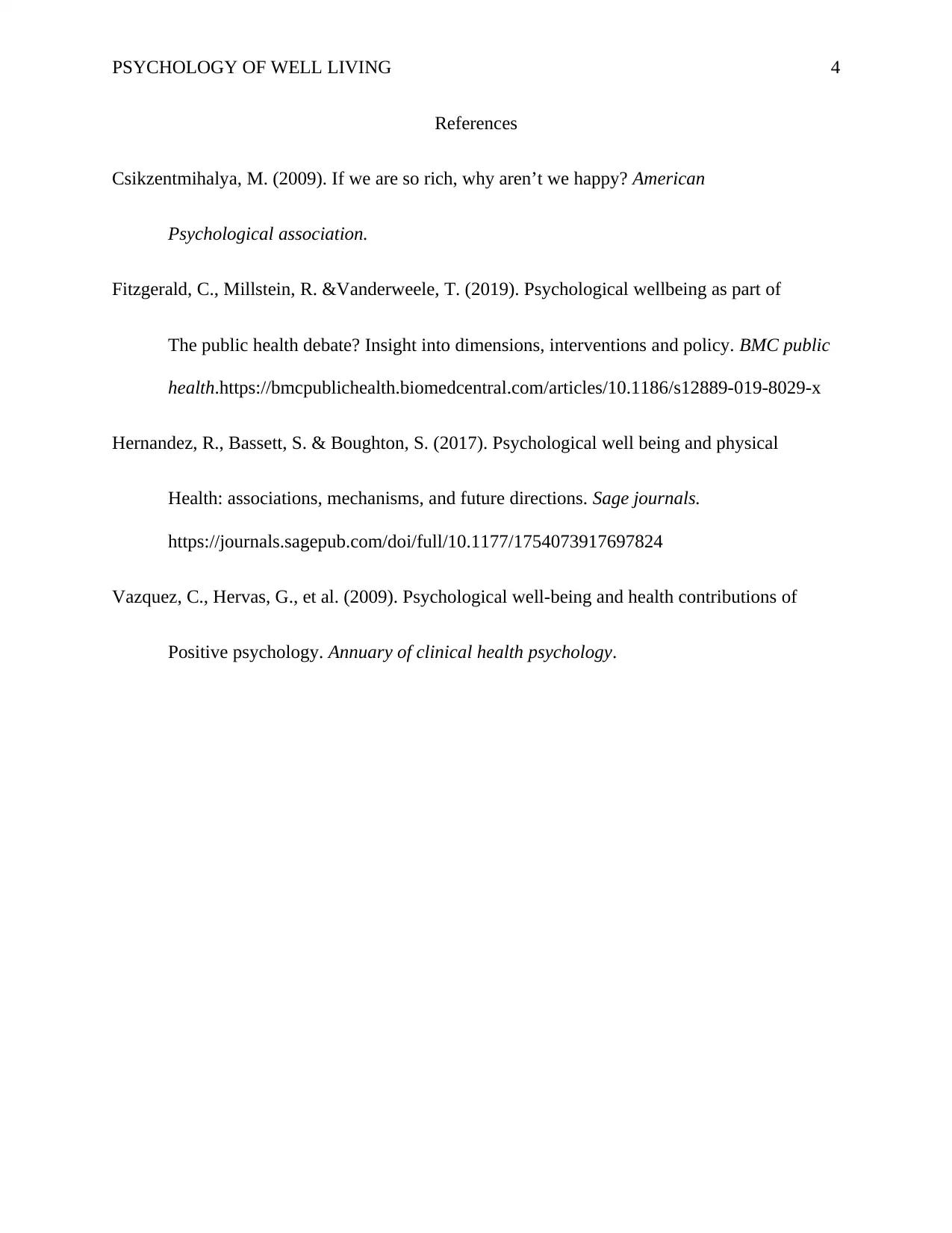PSYCHOLOGY OF WELL LIVING: Happiness Factors and Research Findings
VerifiedAdded on 2022/09/08
|4
|883
|16
Essay
AI Summary
This essay delves into the psychology of well-being, addressing the age-old question of what truly makes individuals happy. It examines the perspectives of psychologists and philosophers, highlighting the debate between material possessions and mental attitudes as sources of happiness. The essay references research that explores the impact of wealth, social well-being, and mindset on life satisfaction, including the concept of the 'flow experience.' It argues that while material wealth can contribute to happiness when balanced with social well-being, an excessive focus on wealth often leads to dissatisfaction. The essay concludes by emphasizing the importance of balancing material goals with social connections to achieve a fulfilling life.

Running head: PSYCHOLOGY OF WELL LIVING
1
Psychology of well living
Name
Institutional affiliation
1
Psychology of well living
Name
Institutional affiliation
Paraphrase This Document
Need a fresh take? Get an instant paraphrase of this document with our AI Paraphraser

PSYCHOLOGY OF WELL LIVING 2
What causes happiness for both genders since systematic thinking was recorded has been
a question of concern. Some say that happiness is as a result of material possessions and others
proclaim it depends on one’s mindset. Over the years, psychologists such as David Home and
Gianbattista Vico have done researches and concluded that happiness is as a result of self-
motivation as well as the wellbeing of one’s social life. Although happiness is a major goal in
everyone’s life, philosophers are progressing slowly to explain what it entails.
According to the author, John Lock showed that to be happy in life, one has to be self-
disciplined though he was a materialist. Although technology has made life lengthen and people
acquire more material wealth, it is clear that people living in western nations do not seem very
satisfied with their life style (Vazquez, Hervas, et al., 2009). It is evident from the suicides, high
rates of crimes, family breakdown among other incidences in the region. In the United States,
wealthiest individuals were found to have less happy lives than those with lower income in
1985(Vazquez, Hervas, et al., 2009). A study was done in 1985 that showed that people with lots
of wealth were not different from those with traumas (Csikzentmihalya, 2009). It also led to
conclusion that children from lowest economic were happier than those from upper and middle
classes. Most people tend to believe that the problems they are facing can be ended if they only
had more money (Hernandez, Bassett, & Boughton, 2017). Having a satisfied family and friends
to spend time with has shown possibilities of having happy life (Hernandez, Bassett, &
Boughton, 2017). It is very promising if the material goals are balanced with social wellbeing of
a person. A person who is only driven by material wealth usually tends to spend all time making
more money and fail to create time for happiness.
Seeing that most people are not happy with their lives, there have been several ways in
which they have tried to program their minds to get happiness. The author says that it is usually
What causes happiness for both genders since systematic thinking was recorded has been
a question of concern. Some say that happiness is as a result of material possessions and others
proclaim it depends on one’s mindset. Over the years, psychologists such as David Home and
Gianbattista Vico have done researches and concluded that happiness is as a result of self-
motivation as well as the wellbeing of one’s social life. Although happiness is a major goal in
everyone’s life, philosophers are progressing slowly to explain what it entails.
According to the author, John Lock showed that to be happy in life, one has to be self-
disciplined though he was a materialist. Although technology has made life lengthen and people
acquire more material wealth, it is clear that people living in western nations do not seem very
satisfied with their life style (Vazquez, Hervas, et al., 2009). It is evident from the suicides, high
rates of crimes, family breakdown among other incidences in the region. In the United States,
wealthiest individuals were found to have less happy lives than those with lower income in
1985(Vazquez, Hervas, et al., 2009). A study was done in 1985 that showed that people with lots
of wealth were not different from those with traumas (Csikzentmihalya, 2009). It also led to
conclusion that children from lowest economic were happier than those from upper and middle
classes. Most people tend to believe that the problems they are facing can be ended if they only
had more money (Hernandez, Bassett, & Boughton, 2017). Having a satisfied family and friends
to spend time with has shown possibilities of having happy life (Hernandez, Bassett, &
Boughton, 2017). It is very promising if the material goals are balanced with social wellbeing of
a person. A person who is only driven by material wealth usually tends to spend all time making
more money and fail to create time for happiness.
Seeing that most people are not happy with their lives, there have been several ways in
which they have tried to program their minds to get happiness. The author says that it is usually

PSYCHOLOGY OF WELL LIVING 3
through drug abuse, some rituals as well as believing in religions. For example Christians believe
in a happy eternal life after earthly death (Fitzgerald, Millstein &Vanderweele, 2019). The
happiness gotten from these experiences require the person to be willing to draw it from the
activity (Csikzentmihalya, 2009). This is known as experience of flow and it has its limitations.
A person may find this flow in activities which may be harmful such as drug abuse.
The author argues that although most people are convinced that if they want to be happy
they must be rich, that is not always the truth. This is true as in being wealthy does not
necessarily mean that there is no possibility of having a happy life. Most people who are driven
by wealth goals end up living unhappy lives. Most of them spend a lot of time focusing on
achieving more money and wealth and forget how small contribution money has on their
happiness. They fail to create time to be with their family, entertainment and socialize with
friends. This makes them end up living a boring live and tend to seek happiness from other
destructive sources such as drugs.
On the other side, when controlled wealth has a significant effect on the happiness of a
person. If the person is able to balance wealth and social life, his life ends up being a happy one.
Money is very essential especially when providing for the family and getting personal needs.
With wealth you can get the needed facilities as well as purchase some services that promise a
happy family. For example a man with wealth, who is capable of providing all the needs of his
family, will have a happy life than the one who has nothing to offer to his family.
through drug abuse, some rituals as well as believing in religions. For example Christians believe
in a happy eternal life after earthly death (Fitzgerald, Millstein &Vanderweele, 2019). The
happiness gotten from these experiences require the person to be willing to draw it from the
activity (Csikzentmihalya, 2009). This is known as experience of flow and it has its limitations.
A person may find this flow in activities which may be harmful such as drug abuse.
The author argues that although most people are convinced that if they want to be happy
they must be rich, that is not always the truth. This is true as in being wealthy does not
necessarily mean that there is no possibility of having a happy life. Most people who are driven
by wealth goals end up living unhappy lives. Most of them spend a lot of time focusing on
achieving more money and wealth and forget how small contribution money has on their
happiness. They fail to create time to be with their family, entertainment and socialize with
friends. This makes them end up living a boring live and tend to seek happiness from other
destructive sources such as drugs.
On the other side, when controlled wealth has a significant effect on the happiness of a
person. If the person is able to balance wealth and social life, his life ends up being a happy one.
Money is very essential especially when providing for the family and getting personal needs.
With wealth you can get the needed facilities as well as purchase some services that promise a
happy family. For example a man with wealth, who is capable of providing all the needs of his
family, will have a happy life than the one who has nothing to offer to his family.
⊘ This is a preview!⊘
Do you want full access?
Subscribe today to unlock all pages.

Trusted by 1+ million students worldwide

PSYCHOLOGY OF WELL LIVING 4
References
Csikzentmihalya, M. (2009). If we are so rich, why aren’t we happy? American
Psychological association.
Fitzgerald, C., Millstein, R. &Vanderweele, T. (2019). Psychological wellbeing as part of
The public health debate? Insight into dimensions, interventions and policy. BMC public
health.https://bmcpublichealth.biomedcentral.com/articles/10.1186/s12889-019-8029-x
Hernandez, R., Bassett, S. & Boughton, S. (2017). Psychological well being and physical
Health: associations, mechanisms, and future directions. Sage journals.
https://journals.sagepub.com/doi/full/10.1177/1754073917697824
Vazquez, C., Hervas, G., et al. (2009). Psychological well-being and health contributions of
Positive psychology. Annuary of clinical health psychology.
References
Csikzentmihalya, M. (2009). If we are so rich, why aren’t we happy? American
Psychological association.
Fitzgerald, C., Millstein, R. &Vanderweele, T. (2019). Psychological wellbeing as part of
The public health debate? Insight into dimensions, interventions and policy. BMC public
health.https://bmcpublichealth.biomedcentral.com/articles/10.1186/s12889-019-8029-x
Hernandez, R., Bassett, S. & Boughton, S. (2017). Psychological well being and physical
Health: associations, mechanisms, and future directions. Sage journals.
https://journals.sagepub.com/doi/full/10.1177/1754073917697824
Vazquez, C., Hervas, G., et al. (2009). Psychological well-being and health contributions of
Positive psychology. Annuary of clinical health psychology.
1 out of 4
Your All-in-One AI-Powered Toolkit for Academic Success.
+13062052269
info@desklib.com
Available 24*7 on WhatsApp / Email
![[object Object]](/_next/static/media/star-bottom.7253800d.svg)
Unlock your academic potential
Copyright © 2020–2025 A2Z Services. All Rights Reserved. Developed and managed by ZUCOL.
